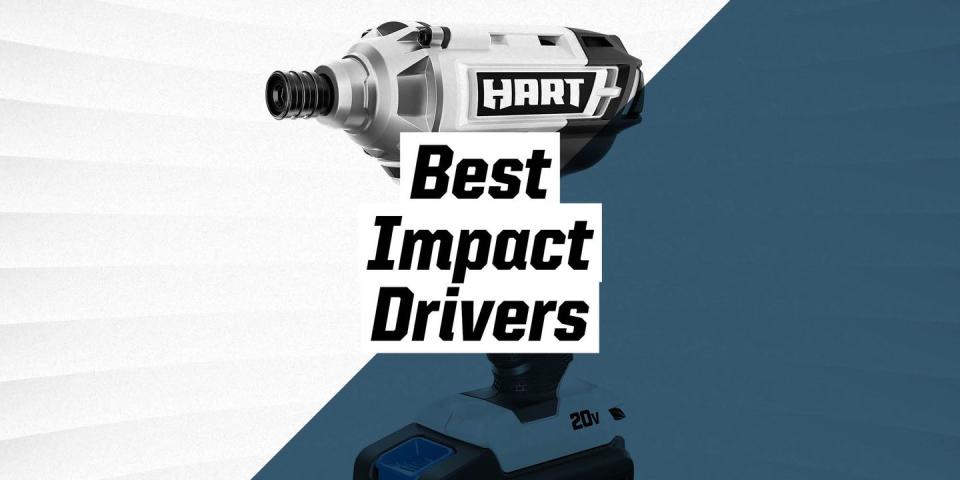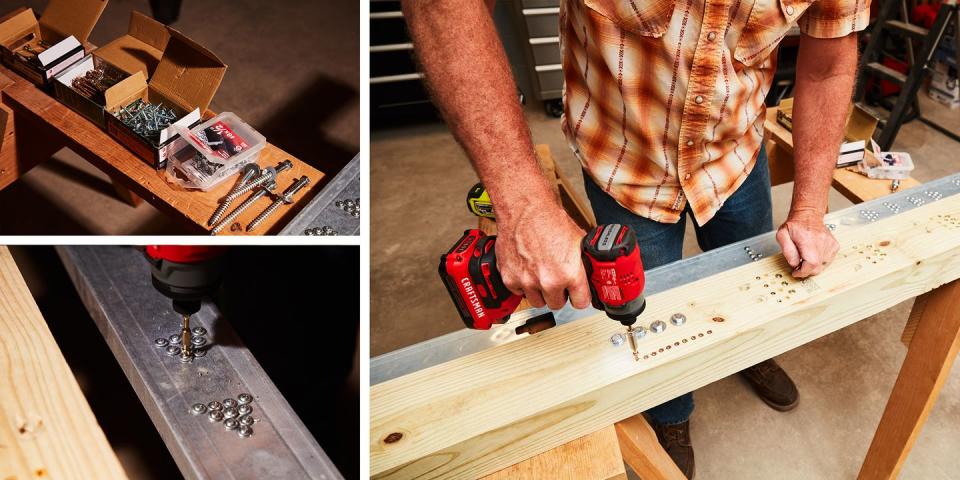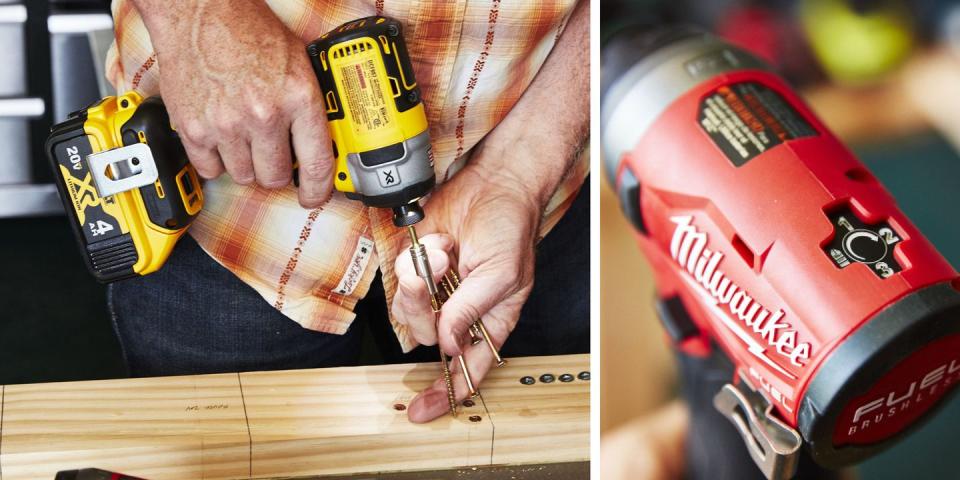The Best Impact Drivers for Any Job

The first power tool people buy is usually a cordless drill/driver due to its versatility. And that’s good, but we’d argue for also investing in a dedicated impact driver. One can make myriad tasks easier, such as building decks, screwing down plywood, installing tile backer board, or any other job that requires driving long screws into wood.
See quick info below on the five best impact drivers from our testing, then scroll deeper for buying info, a primer on how we tested, and full reviews of these and other top-performing options.
An impact driver, unlike a drill, has a spring-loaded, quick-release chuck that accepts 1⁄4-inch hex-shank driver bits. This tool is designed to drive wood and sheet-metal screws, but it can also turn a bolt with help from an impact-rated socket. Faster than a cordless drill, an impact driver’s compactness makes it easier to handle, especially in tight spots or when you’re standing on a ladder. It drives and removes by applying concussive, rotational force to the screw or bolt head. This delivers significantly more torque than a drill yet is less likely to twist your wrist when the fastener stops or binds.
When you add an impact driver to your arsenal, you’ll need some impact-rated 1⁄4-inch hex bits. Plain 1⁄4-inch hex bits meant for use with a drill/driver may not hold up in an impact driver. These selection here is comprised of some of the best we’ve tested, designed specifically for impact drivers.
Consider This Before Buying an Impact Driver
How We Tested These Impact Drivers
We started off by narrowing down the pool of contenders. We researched the market, surveyed user reviews, interviewed product managers and engineers, and relied on our own experience operating these tools. Once we had our testing batch, we used each impact driver to repeatedly drive and remove numerous types of fasteners in different materials. We evaluated them on performance, price, comfort, value, and versatility to determine which we believe will best serve your needs.
―BEST OVERALL―
Milwaukee M18 Fuel Surge
Power: 18 volts | Motor: Brushless | RPM: 3,000 | IPM: 4,000 | Torque: 450 in.-lb | Kit includes: Impact driver, two 2.0-Ah batteries, charger, hard case | Warranty: Limited, 5-year
The M18 Surge uses a hydraulic drive technology that eliminates metal-on-metal contact, making it much quieter than traditional impact drivers. It also requires less torque, and because the torque is sustained much longer, it can drive tough fasteners faster. The M18 Surge features three speed settings and a dedicated, effective, self-tapping screw mode that helps get screws started and prevents them from stripping out. The cherries on top are the battery gauge and an LED to illuminate your work area.
―BEST FOR SERIOUS DIYERS—
Kobalt XTR Max
Power: 24-volt | Motor: Brushless | RPM: 3,400 | IPM: 4,000 | Torque: 2,400 in.-lb | Kit includes: Impact driver, 4-Ah battery, charger, hard case | Warranty: 5-year limited
Kobalt’s XTR Max offers an advanced, assist driving mode for what we consider to be a reasonably priced tool. During our test we noted that assist mode slowed RPMs to help get screws started, while preventing the fasteners from over-tightening as they seated. The XTR has three selectable speed modes to tailor driving for the fastener and material you’re working with. We handily drove all our longer deck screws with the XTR, as well as shorter, self-tapping screws. When we drove the lag bolts, we found it to be competent, straining appropriately for the task. We appreciated the battery level indicator, a feature usually reserved for more expensive models. While the tool head is slightly on the larger size, making it feel slightly clunky in tight spaces, the Cobalt XTR is a solid impact driver for the money.
―BEST VALUE—
Ryobi One+ HP
Power: 18-volt | Motor: Brushed | RPM: 2,900 | IPM: 3,800 | Torque: 1,700 in.-lb | Kit includes: Impact driver, drill/driver, two 1.5-Ah batteries, charger, soft case | Warranty: Limited, 3-year
The One+ comes as part of an affordable drill-driver kit. Having both the drill and driver is handy and saves you from having to switch bits back and forth on jobs that require both. This relatively basic driver will accomplish most tasks you’ll encounter around the house. With its 18 volts and 1,700 inch-pounds of torque, we were able to drive long fasteners and lag bolts, even without pilot holes. We found the variable-speed trigger allowed us to easily manage RPMs from zero to 2,900 at up to 3,800 IPM. The tool has a compact head, measuring 5.5 inches from front to back, which helped reaching fasteners in tight areas. The quick-release chuck seemed a little awkward at first, and we found that it works better on some bits than others.
―BEST LIGHTING―
DeWalt Atomic Max
Power: 20-volt | Motor: Brushless | RPM: 3,250 | IPM: 3,800 | Torque: 1,825 in.-lb | Kit includes: Impact driver, 5-Ah battery, charger, soft carrying/storage case | Warranty: 3-year limited, 1-year free service
The 20-volt Atomic is a solid, contractor-quality tool with three driving speeds. Alongside the lowest speed setting (1,000 RPM) is a screw icon that suggests a screw-driving mode. As far as we could tell during testing, it isn’t, and the specs don’t mention anything about it. However, the lower speed does work well for starting screws—especially self-tapping fasteners. Nothing we drove during testing fazed the Atomic much. Long deck and cabinet screws drove equally well, as well as self-tapping screws in metal studs. As with other models we tested, long lag bolts took the most work, but we were able to drive them in steadily without drama using the DeWalt. We measured the length of the compact tool’s head at 4 inches, which is super short—even compared to smaller 12-volt drivers. This means you’ll be able to reach into tighter places than with other models. And tight, dark places bring us to one of our favorite features (noted on other DeWalt drivers we’ve tested, too): lighting. The Atomic has three LEDs oriented around the chuck, which illuminate the work area very well, leaving no shadows.
―BEST ONE-HANDED CHUCK―
Flex Quick Eject Hex
Power: 24-volt | Motor: Brushless | RPM: 4,000 | IPM: 4,450 | Torque: 2,500 in.-lb | Kit includes: Impact driver, 5-Ah battery, 2.5-Ah battery, charger, hard case | Warranty: 5-year end-to-end
A relative newcomer to the cordless-tool arena, Flex has aimed high with tools designed for contractors and building trade professionals. As such, its Quick Eject Hex comes equipped with advanced features that make it a versatile performer. We’ve come to appreciate impact tools with special drive modes, and this one comes with five. There are three speeds and two self-tapping screw modes—one for small fasteners, another for large ones. The self-tapping modes proved their worth when we drove screws into metal studs, as we were able to easily start the screws and prevent over-driving them and stripping them out. Teh same for long deck screws. And with its two batteries, we had plenty of juice to finish most jobs. When we drove lag bolts into treated landscaping lumber, we easily drove the heads, cupping the washers we used, deep into the wood. The one-handed chuck on the Flex was unlike any other models we tested. We pressed a button, just above the trigger, to open the chuck and accept or release a bit.

―VERSATILE 12-VOLT―
Bosch Max EC
Power: 12-volt | Motor: Brushless | RPM: 2,600 | IPM: 3,100 | Torque: 975 in.-lb | Kit includes: Impact driver, two 2.0-Ah batteries, charger, soft case | Warranty: Limited, 1-year
We’ve found 12-volt, compact impact drivers to be super handy and useful. Bosch’s Max is no exception, as it’s become our go-to tool for random tasks that pop up. A low-speed, low-torque setting renders small, delicate jobs (where overdriving a fastener can be a problem) worry-free. In our testing, the Max completed every task, including driving 4.5-inch-long, 3⁄8-inch lag bolts—without pilot holes. It did drive slower and work harder than a larger driver, but it got the job done. And to be fair, Bosch claims this driver is designed to cover 85 percent of the types of driving tasks on professional job sites. So building a deck with it isn’t ideal, but building or hanging cabinets, installing drawer slides, assembling furniture, working on electrical boxes, and taking on any task in a confined space or overhead is fair game.
―BEST WARRANTY―
Metabo HPT WH18DBFL2QB Cordless
Power: 18-volt | Motor: Brushless | RPM: 3,100 | IPM: 3,400 | Torque: 1,522 in.-lb | Kit includes: Impact driver, 1.5-Ah battery, charger | Warranty: Lifetime on the driver, 2 years on the battery, 1 year on the charger
This 18-volt impact driver from Metabo HPT, formerly Hitachi, is part of the company’s new line of black tools. Built with the same quality, and warranty, as its green tools, the black versions strip away some of the advanced features, bringing the cost down. While it’s nice to have multiple driving speeds and modes, they’re not required to get a job done. This basic impact driver has the same torque as its green counterpart and drove all the fasteners in our test well, including 4.5-inch-long lag bolts. We also used it to remove 5⁄16-inch, grade-8 bolts torqued up to 40 foot-pounds.

―MOST ADVANCED FEATURES―
Makita LXT 4-Speed
Power: 20-volt | Motor: Brushless | RPM: 3,600 | IPM: 3,800 | Torque: 1,600 in.-lb | Kit includes: Impact driver, two 2.0-Ah batteries, rapid charger, hard case | Warranty: Limited, 3-year
Visually, Makita’s LXT impact driver is svelte and compact—pull the trigger and you’ll immediately notice the smooth, quiet motor. These are the marks of a tool intended for daily professional use. This is backed up by numerous speed/mode settings for any type of application, although deciphering them may seem daunting at first. There are four speed settings, wood and bolt modes, and two tightening modes that prevent fastener breakage or stripping. Once mastered, these modes help perform repetitive tasks with consistent results.
―MOST TORQUE―
Metabo HPT Triple Hammer
Power: 18-volt | Motor: Brushless | RPM: 2,900 | IPM: 4,000 | Torque: 1,832 in.-lb | Kit includes: Impact driver, two 3.0-Ah batteries, rapid charger, hard case | Warranty: Lifetime
Metabo HPT’s 18-volt Triple Hammer uses three anvils to deliver more impacts per revolution. This drives fasteners quicker, produces a more uniform sound, and reduces vibration. There are four modes: soft, normal, power, and a self-tapping option that starts slower and backs off as the fastener seats. Self-tapping mode is intended more for sheet-metal screws but also works to get screws easily started in hard wood. The contractor-grade tool also has an IP56 rating, which means it will resist intrusion by direct jets of water.
―BEST IN TIGHT SPACES―
Milwaukee M12 Fuel Surge
Power: 12-volt | Motor: Brushless | RPM: 3,300 | IPM: 3,550 | Torque: 1,300 in.-lb | Kit includes: Impact driver, two 2.0-Ah batteries, charger, hard case | Warranty: Limited, 5-year on the driver, 2 years free service on the battery
The M12 Fuel was capable of driving every fastener the 18- and 20-volt drivers did, including 3⁄8 x 3-inch lag bolts, without a pilot hole. Not an ideal task for this driver, but it got the job done. Two inches shorter than most drivers, with a compact head, the M12 Fuel is great in tight spaces. And a single LED works to light those dark nooks and crannies. We liked the easy-to-use speed/mode selector on the top of the tool, with three speeds and a self-tapping fastener mode. Self-tapping mode starts slower to prevent walking and then backs off as the screw finishes seating. The M12 Fuel is a contractor-quality tool, built to hold up to daily use.
You Might Also Like
